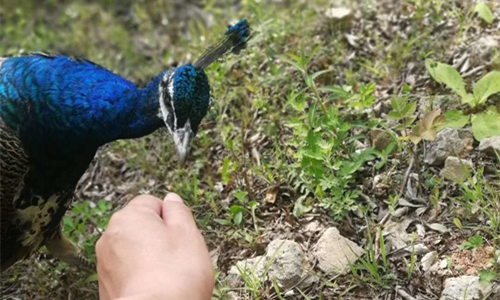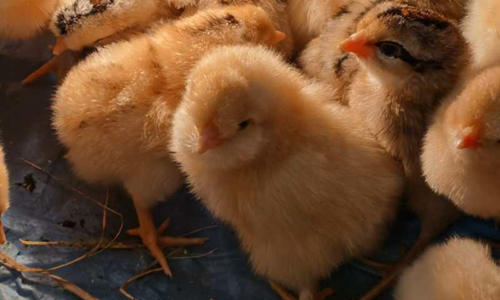Chinese wildlife farmers try to change direction after trade ban
By Huang Lanlan Source:Global Times Published: 2020/4/21 23:37:18
Chinese wildlife farmers try to change direction after trade banChinese wildlife farmers try to change direction after trade ban

Wang Daojin has reared blue peacocks for 10 years before the wildlife trade ban (photo: courtesy of Wang)
Chinese farmers who rear wild animals for meat are trying hard to survive after the government's ban on all wildlife trade in the wake of the deadly novel coronavirus (COVID-19) pandemic.Wang Daojin, a peacock farmer in East China's Anhui Province, said he has suffered big losses and has had to give up his 10-year peacock raising career because of the ban. This former local "peacock king" is shifting his business to breeding hens.
The Standing Committee of the National People's Congress, China's top legislature, adopted a decision in late February which prohibits the consumption of terrestrial wild animals "of important ecological, scientific and social value" that are under state protection, including those that are bred or reared in captivity.
Agriculture authorities also released a new draft list of animals that can be farmed for meat earlier this month. The list is available for a period for public comment.
Blue peacocks are not on this list, indicating that Wang may not be allowed to breed or sell it for meat. "I almost collapsed in the beginning," Wang recalled, adding that he has raised more than 600 blue peacocks, bringing 1 million yuan ($141,137) of yearly turnover.
To survive this financial crisis, Wang began trying to raise poultry instead since late February. He bought 2,000 chickens and built 100-square-meter henhouses. He also raised 200 goslings and some fish larvae.
Following Wang, four other local peacock breeders have started to raise poultry and fish. "I'm confident in the future by and large," Wang told the Global Times Tuesday, estimating that his 2,000 chickens may create 400,000 yuan of income this summer.
Yang Hongchang, a snake farmer and dealer based in East China's Zhejiang Province, also said some of his local peers have turned to other fields including fishing and planting after the government banned the snake trade.
His village Zisiqiao, dubbed China's "No.1 Snake Village," raised nearly 3 million snakes before the pandemic. "Now the number has plummeted," Yang told the Global Times Tuesday.
The snakes currently being kept in the village are not for meat but for medical use, which are legal subject to examination, approval and quarantine inspection procedures, Yang explained.

Wang Daojin swifts from rearing peacocks to poultry (photo: courtesy of Wang)
Call for supportFacing the unprecedented hard times, some wild animal raisers including Yang and Wang said they are hoping for government support to get over the difficulties.
Wang's 600 blue peacocks are still kept on his farm. Wang hopes that the local government can help deal with the peacocks, whose meat probably can't be sold anymore, as the animals still cost him 400 yuan for fodder per day.
Wang also called for support in his business transformation. "It would be appreciated if the government provided subsidies to make up some of my losses from not trading peacock meat, and if it could help establish market channels for selling poultry and fish," he said.
Responding to the needs of wildlife traders like Wang, many regional authorities across the country including those in Jiangxi, Sichuan, Guangzhou and Guizhou provinces are reportedly compensating or offering supporting policies.
In Zhaoqing, South China's Guangdong Province, where there are 423 wildlife farms raising over 5.6 million terrestrial animals such as snakes and bamboo rats, authorities have drafted a series of plans to compensate local wildlife breeders and help them dispose of their animals and guide them to other businesses, according to the Zhaoqing Forestry Bureau.
"The draft is available for a comment period, and will be determined at the end of April," an official with the bureau surnamed Wu told the Global Times Tuesday.
Posted in: SOCIETY